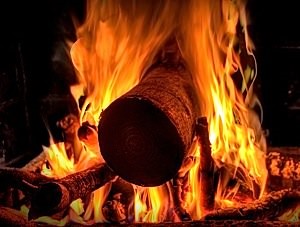
The custom of burning the Yule Log goes back to, and before, medieval times. It was originally a Nordic tradition. Yule is the name of the old Winter Solstice festivals in Scandinavia and other parts of northern Europe, such as Germany.
The Yule Log was originally an entire tree, that was carefully chosen and brought into the house with great ceremony. The largest end of the log would be placed into the fire hearth while the rest of the tree stuck out into the room! The log would be lit from the remains of the previous year’s log which had been carefully stored away and slowly fed into the fire through the Twelve Days of Christmas. It was considered important that the re-lighting process was carried out by someone with clean hands. Nowadays, of course, most people have central heating so it is very difficult to burn a tree!
In Provence (in France), it is traditional that the whole family helps to cut the log down and that a little bit is burnt each night. If any of the log is left after Twelfth Night, it is kept safe in the house until the next Christmas to protect against lightning! This was also done in some parts of Holland, but the log had to be stored under a bed! In some eastern European countries, the log was cut down on Christmas Eve morning and lit that evening.
In the UK, the log is called ‘The Mock’. The log is dried out and then the bark is taken off it before it comes into the house to be burnt. Also in the UK, barrel makers (or Coopers as barrel makers were traditionally called) gave their customers old logs that they could not use for making barrels for Yule logs.